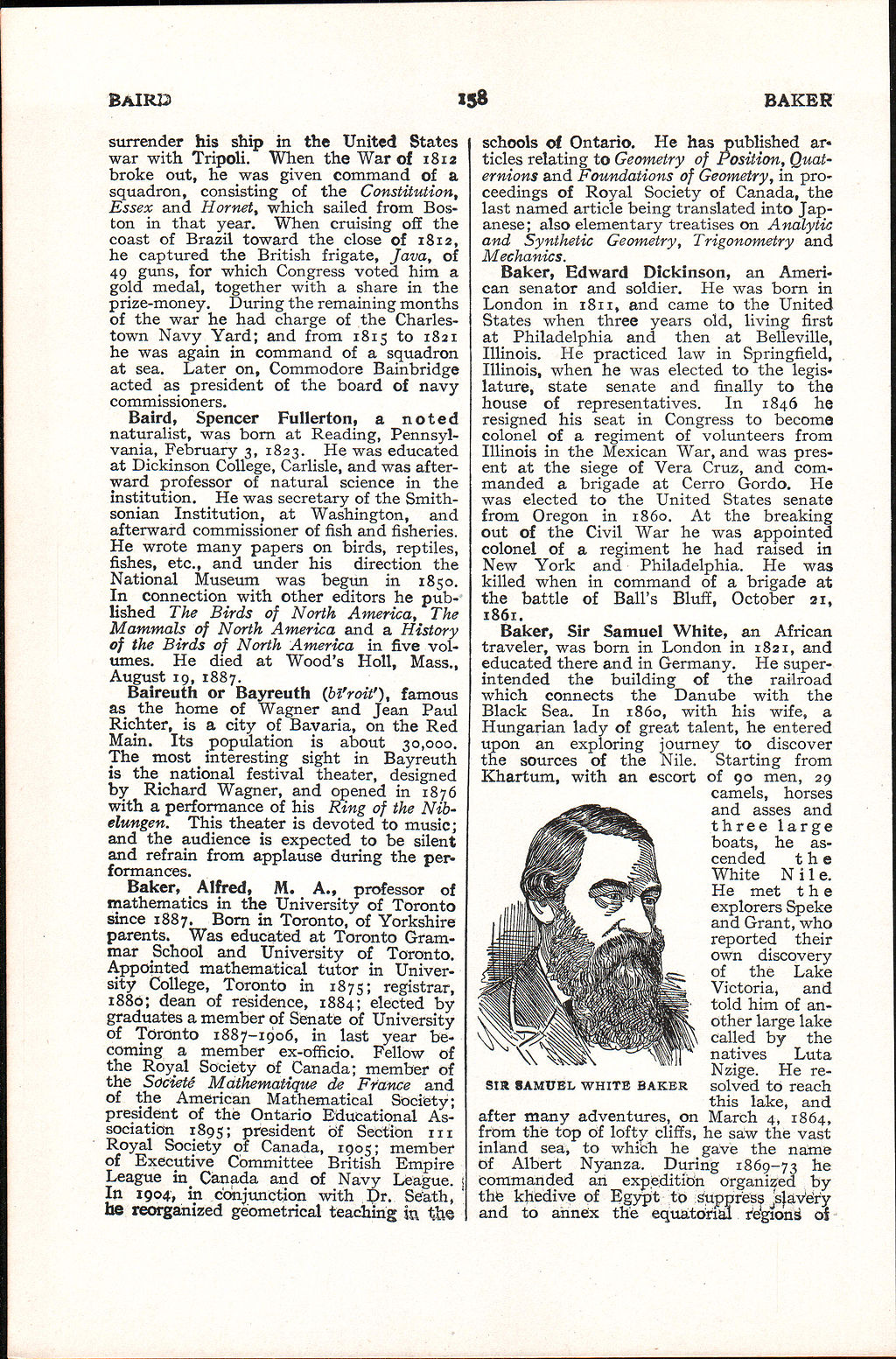surrender his ship in the United States war with Tripoli. When the War of 1812 broke out, he was given command of a squadron, consisting of the Constitution, Essex and Hornet, which sailed from Boston in that year. When cruising off the coast of Brazil toward the close of 1812, he captured the British frigate, Java, of 49 guns, for which Congress voted him a gold medal, together with a share in the prize-money. During the remaining months of the war he had charge of the Charles-town Navy Yard; and from 1815 to 1821 he was again in command of a squadron at sea. Later on, Commodore Bainbridge acted as president of the board of navy commissioners.
Baird, Spencer Fullerton, a noted naturalist, was born at Reading, Pennsylvania, February 3, 1823. He was educated at Dickinson College, Carlisle, and was afterward professor of natural science in the institution. He was secretary of the Smithsonian Institution, at Washington, and afterward commissioner of fish and fisheries. He wrote many papers on birds, reptiles, fishes, etc., and under his direction the National Museum was begun in 1850. In connection with other editors he published The Birds of North America, The Mammals of North America and a History of the Birds of North America in five volumes. He died at Wood's Holl, Mass., August 19, 1887.
Baireuth or Bayreuth (bl'roit'), famous as the home of Wagner and Jean Paul Richter, is a city of Bavaria, on the Red Main. Its population is about 30,000. The most interesting sight in Bayreuth is the national festival theater, designed by Richard Wagner, and opened in 1876 with a performance of his Ring of the Nib-elungen. This theater is devoted to music; and the audience is expected to be silent and refrain from applause during the performances.
Baker, Alfred, M. A., professor of mathematics in the University of Toronto since 1887. Born in Toronto, of Yorkshire parents. Was educated at Toronto Grammar School and University of Toronto. Appointed mathematical tutor in University College, Toronto in 1875; registrar, 1880; dean of residence, 1884; elected by graduates a member of Senate of University of Toronto 1887-1906, in last year becoming a member ex-officio. Fellow of the Royal Society of Canada; member of the Society Mathematique de France and of the American Mathematical Society; president of the Ontario Educational Association 1895; president of Section in Royal Society of Canada, 1905; member of Executive Committee British Empire League in Canada and of Navy League. In 1904, in conjunction with Pr. Se'ath, be reorganized geometrical teaching in the schools of Ontario. He has published articles relating to Geometry of Position, Quaternions and Foundations of Geometry, in proceedings of Royal Society of Canada, the last named article being translated into Japanese; also elementary treatises on Analytic and Synthetic Geometry, Trigonometry and Mechanics.
Baker, Edward Dickinson, an American senator and soldier. He was born in London in 1811, and came to the United States when three years old, living first at Philadelphia and then at Belleville, Illinois. He practiced law in Springfield, Illinois, when he was elected to the legislature, state senate and finally to the house of representatives. In 1846 he resigned his seat in Congress to become colonel of a regiment of volunteers from Illinois in the Mexican War, and was present at the siege of Vera Cruz, and commanded a brigade at Cerro Gordo. He was elected to the United States senate from Oregon in 1860. At the breaking out of the Civil War he was appointed colonel of a regiment he had raised in New York and Philadelphia. He was killed when in command of a brigade at the battle of Ball's Bluff, October 21, 1861.
Baker, Sir Samuel White, an African traveler, was born in London in 1821, and educated there and in Germany. He superintended the building of the railroad which connects the Danube with the Black Sea. In 1860, with his wife, a Hungarian lady of great talent, he entered upon an exploring journey to discover the sources of the Nile. Starting from Khartum, with an escort of 90 men, 29 camels, horses and asses and three large boats, he ascended the White Nile. He met the explorers Speke and Grant, who reported their own discovery of the Lake Victoria, and told him of another large lake Called by the natives Luta Nzige. He resolved to reach this lake, and after many adventures, on March 4, 1864, from the top of lofty cliffs, he saw the vast inland sea, to which he gave the name of Albert Nyanza. During 1869-73 he commanded an expedition organized by the khedive of Egypt to suppress jsjayery and to annex the equatorial Regions of
An image should appear at this position in the text. To use the entire page scan as a placeholder, edit this page and replace "{{missing image}}" with "{{raw image|LA2-NSRW-1-0197.jpg}}". Otherwise, if you are able to provide the image then please do so. For guidance, see Wikisource:Image guidelines and Help:Adding images. |
SIR SAMUEL WHITE BAKER
